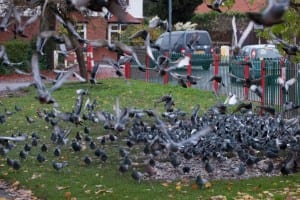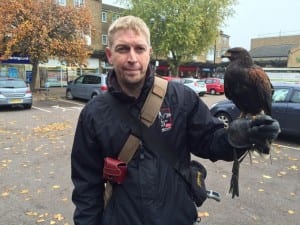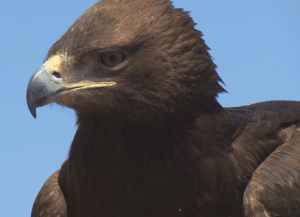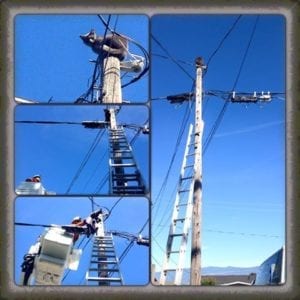
by Pigeon Patrol | Jul 1, 2016 | Animal Deterrent Products, Pigeon Patrol's Services, Pigeons in the News

CARLSBAD, N.M. — A New Mexico city in cracking down on people feeding pigeons.
KRQE-TV in Albuquerque reports that the Carlsbad city council recently approved an ordinance that bans residents from feeding or providing environments that attract the birds.
The city says the ordinance will help eliminate some of the health risks associated with pigeon droppings.
Those caught feeding or harboring the birds could face fines up to $500 or even jail time.
Eddy County Extension Office program director Woods Houghton says pigeons communicate a lot of known diseases to both livestock and humans
About Pigeon Patrol:
Pigeon Patrol Products & Services is the leading manufacturer and distributor of bird deterrent (control) products in Canada. Pigeon Patrol products have solved pest bird problems in industrial, commercial, and residential settings since 2000, by using safe and humane bird deterrents with only bird and animal friendly solutions. At Pigeon Patrol, we manufacture and offer a variety of bird deterrents, ranging from Ultra-flex Bird Spikes with UV protection, Bird Netting, 4-S Gel and the best Ultrasonic and audible sound devices on the market today.
Voted Best Canadian wholesaler for Bird Deterrent products four years in a row.
Contact Info: 1- 877– 4– NO-BIRD (www.pigeonpatrol.ca)

by Pigeon Patrol | Jun 29, 2016 | Animal Deterrent Products, Bird Deterrent Products, Pigeon Patrol's Services
 MOVE over Ospreys — there’s another bird of prey over Swansea.
MOVE over Ospreys — there’s another bird of prey over Swansea.
Specially trained hawks are being introduced to keep a watchful eye over Swansea Market, where they will be deployed above the roof area of the historic attraction to act as a deterrent to troublesome gulls.
Swansea Council says the nesting and scavenging of gulls has been a problem on the roof area of the market for a number of years, with issues including bird droppings, roof damage and blocked guttering.
And shoppers have even been targeted by greedy gulls attempting to snatch food from their hands.
The task will be carried out by national licensed supplier of bird control, Hawksdrift, based near Builth Wells.
The business trains hawks from a young age, to ensure they are socialised and not a danger to humans, and is responsible for similar work at Aberwystwyth University, as well as taking part in falconry displays, and taking the birds into schools for pupils to learn about them.
Representatives were due to visit the market on Friday to speak with traders and answer any questions they may have about the work – although the date is to be rescheduled following today’s fire at the venue.
Hawksdrift director Layla Bennett said the hawks do not attack the gulls to disperse them, but do so by scaring them.
She said: “A common misconception is that the hawk deterrent works by them attacking or even eating the gulls, but that is not the case.
“It is about scaring them. They will be flying over the roof, to deter them from nesting. Just their presence in general acts as a deterrent. They do not have to attack or hurt the other birds.
“Gulls are becoming an increasing problem in urban populations. They are more confident around people, and they are exceptionally intelligent birds, who will swoop down and sometimes even attempt to take food from people. In places like Swansea the main type you have are the lesser black backed and herring gulls”.
The Harris’ hawks are due to visit Swansea Market around once a week over the spring and summer months, and include 11-year-old Sharpe, sisters Lizzie and Jenny, aged four, and youngster Saxon, who is almost a year old.
Layla said: “All of them are reared in a special manner in order to socialise them from a very young age. They are captively bred and reared.
“They are also trained to get them used to everyday objects and issues they may come across, such as high visibility clothing, hard hats, fire alarms going off and fork lifts trucks.
“And dispersal of gulls by scaring is a very environmental friendly.”
Hawksdrift will provide regular site visit reports and statistics through an online management information system, so Swansea Council can monitor progress.
Their introduction follows completion of recent upgrade work at the market, including refurbishment of the existing barrel roof and renewal of the roof gable glazing.
The award winning venue is the largest indoor market in Wales, and opens six days a week, with more than 100 stalls selling local and traditional produce.
The refurbishment project was funded by Swansea Council and the Building Enhancement Programme, which is supported by the European Regional Development Fund through the Welsh Government.
This isn’t about harming the gulls.
GULLS are not only a nuisance to shoppers visiting Swansea city centre, but they also damage the appearance its buildings — and are guilty of fouling the streets.
Robert Francis-Davies, Swansea Council’s cabinet member for enterprise, development and regeneration, said: “We recently heavily invested in a major project to refurbish Swansea Market’s roof for the benefit of traders and shoppers for many years to come, so it’s crucial we continue to do all we can to preserve the attraction.
“Gulls have been an issue outside the building in the area of the market roof for several years now, affecting its appearance and causing damage and maintenance concerns. The company we’re bringing in are experts in this area, having successfully addressed similar problems at many buildings in other parts of the UK. What they offer is an innovative, effective, natural and environmentally-friendly solution to an on-going problem.
“This isn’t about harming the gulls in the area of the market roof because nobody wants that. It’s about using highly-trained hawks to act as a deterrent to the gulls and keep them away from the building. Traders will be updated on the effectiveness of the scheme over coming months.”
About Pigeon Patrol:
Pigeon Patrol Products & Services is the leading manufacturer and distributor of bird deterrent (control) products in Canada. Pigeon Patrol products have solved pest bird problems in industrial, commercial, and residential settings since 2000, by using safe and humane bird deterrents with only bird and animal friendly solutions. At Pigeon Patrol, we manufacture and offer a variety of bird deterrents, ranging from Ultra-flex Bird Spikes with UV protection, Bird Netting, 4-S Gel and the best Ultrasonic and audible sound devices on the market today.
Voted Best Canadian wholesaler for Bird Deterrent products four years in a row.
Contact Info: 1- 877– 4– NO-BIRD (www.pigeonpatrol.ca)

by Pigeon Patrol | Jun 28, 2016 | Animal Deterrent Products, Bird Deterrent Products, Pigeon Patrol's Services
 The man admitted to killing the hawks he believed were preying on his prized racing pigeons he kept in Stamford.
The man admitted to killing the hawks he believed were preying on his prized racing pigeons he kept in Stamford.
A racing pigeon enthusiast has pleaded guilty in U.S. District Court to charges that he killed federally-protected hawks that apparently were preying on his prized birds that he kept in Stamford.
Connecticut’s U.S. Attorney Deirdre Daly and Special Agent in Charge of the Northeast Region of the U.S. Fish and Wildlife Service’s Office of Law Enforcement Honora Gordon announced that the 63-year-old man pleaded guilty Wednesday in Hartford federal court to one count of conspiracy to take, capture and kill red-tailed hawks and Cooper’s hawks, and four counts of taking, capturing and killing red-tailed hawks or Cooper’s hawks.
According to court documents and statements made in court, red-tailed hawks and Cooper’s hawks are birds of prey, also known as raptors, and consume pigeons as part of their natural diet. These hawks are protected under the federal Migratory Bird Treaty Act.
To sign up for breaking Stamford news alerts and more, click here.
In his guilty plea, Thomas Kapusta of Westbury, NY admitted that he and another individual were racing pigeon enthusiasts who built and maintained a pigeon coop at 330 Weed Ave. in Stamford. Kapusta and his unidentified associate kept a large number of racing pigeons at this coop, and regularly let them fly outside the coop for exercise.
Prosecutors said that because Kapusta and his associate viewed the hawks as a threat to their pigeons, they systematically captured the hawks in a trap specifically designed to capture birds of prey, shot and killed them in the trap, and disposed of their carcasses.
Kapusta admitted that he and the associate killed red-tailed hawks on Sept. 8 and Oct. 14, 2015, and Cooper’s hawks on Sept. 2 and Oct. 21, 2015.
Kapusta faces a maximum sentence of 30 months in jail and a $75,000 fine when he is sentenced by U.S. District Judge Robert N. Chatigny on May 13.
In a statement, Daly said, “Red-tailed and Cooper’s hawks are protected species under federal law. With our law enforcement partners, the U.S. Attorney’s Office will continue to investigate and prosecute individuals who violate the law and harm such protected migratory birds.”
Gordon praised the cooperation with state and local agencies in investigating the case. “The plea agreement today is a success in our collective efforts to conserve migratory birds and other wildlife,” Gordon said.
When asked for comment about the second individual allegedly involved in the hawk killings, a spokesman for Daly said, “Kapusta is the only one charged at the moment.”
The case is being investigated by the U.S. Fish and Wildlife Service, Office of Law Enforcement and the Division of Refuge Law Enforcement, and the Environmental Conservation Police of the Connecticut Department of Energy and Environmental Protection, with the assistance of the Stamford Police Department. The case is being prosecuted by Assistant U.S. Attorney Hal Chen.
About Pigeon Patrol:
Pigeon Patrol Products & Services is the leading manufacturer and distributor of bird deterrent (control) products in Canada. Pigeon Patrol products have solved pest bird problems in industrial, commercial, and residential settings since 2000, by using safe and humane bird deterrents with only bird and animal friendly solutions. At Pigeon Patrol, we manufacture and offer a variety of bird deterrents, ranging from Ultra-flex Bird Spikes with UV protection, Bird Netting, 4-S Gel and the best Ultrasonic and audible sound devices on the market today.
Voted Best Canadian wholesaler for Bird Deterrent products four years in a row.
Contact Info: 1- 877– 4– NO-BIRD (www.pigeonpatrol.ca)

by Pigeon Patrol | Jun 27, 2016 | Animal Deterrent Products, Pigeon Patrol's Services, Pigeon Spikes
 It seems both FortisBC and BC Hydro protocols to deal with animals on power poles has been tested a lot lately, with at least four high-profile incidents in a short timeframe reported across the province. Representatives said it’s rare to receive that many calls.
It seems both FortisBC and BC Hydro protocols to deal with animals on power poles has been tested a lot lately, with at least four high-profile incidents in a short timeframe reported across the province. Representatives said it’s rare to receive that many calls.
Nicole Bogdanovic, a communications adviser for FortisBC, said they got a call of another cat on a power pole on June 4 just after 9:30 a.m. The crews were already in the Black Mountain area of Kelowna, where the cat found its new perch, so they stopped to help it down.
On June 4, FortisBC rescued a cat who was perched on a live power pole in Kelowna.
Bogdanovic said when considering a rescue, they focus on safety first.
“While calls like this are pretty rare, when we do receive one we have to assess the situation very carefully before responding, and typically the safest situation is for the cat to come down on its own,” said Bogdanovic.
“We’re relieved that our crews were able to assist in this case.”
In this type of situation, they assess the risk a rescue would pose to both the animal and crew, as well as potential service impacts.
.PNG)
She said crews ask a few simple questions before intervening: “Could this cause an outage if it wasn’t dealt with, or could this delay our crews in dealing with other issues?”
They also have to make sure the infrastructure belongs to them before they do anything with it.
In the end, it was a happy ending for the cat who was stuck up on a power pole, but it’s not always such an easy save.
“A cat on a pole, if it’s in distress, could be skittish,” Bogdanovic said. “That could cause it to behave unpredictably and be injured in some way.
“We recognize that this is really a tough situation for pet owners to be in and we do what we can to assist, but again, that’s usually waiting for the cat to come down on its own.”
Just one day earlier, BC Hydro crews had to move two 40-kilogram osprey nests from power poles in Salmon Arm to two newly built nesting platforms nearby.

On June 3, BC Hydro crews moved an Osprey nest near Salmon Arm.
In the last few weeks, the nests caused three power outages to thousands of customers in the area.
Ospreys are a protected species in B.C. and BC Hydro has a permit from Ministry of Forests Lands and Natural Resources to allow the nests to be moved. The birds like to build their nests on the tallest structures they can find, which in some cases means a live power pole. If the nest doesn’t pose any risk, workers often wait to move it until it’s unoccupied in fall.
Jennifer Walker-Larsen, who works in communications for BC Hydro, said this case was different.
“When osprey nest on energized power lines there is a risk to those nests,” she said, “They may short out the lines and they may catch on fire and this can kill and wound birds.”

Crews saw that the nest were there and decided to act.
Osprey in the area already had another nesting platform, but Canada geese had taken it over. Nesting Canada geese cannot be disturbed as they are protected under the Migratory Bird Convention Act.
When this happens, the osprey usually tries to build another nest very close to the original site, usually on a nearby power pole.
Workers had to first move the eggs in the nest and then relocate it to a new nesting platform a short drive away. The eggs were placed safely back in the nest.

Over the last weekend in May, BC Hydro crews took the time to rescue a bear in Port Hardy that was camping out on top of a 50-foot power pole.
“There was an immediate risk there that the bear might be electrocuted so we took immediate action.
The 25,000-volt power line was deactivated as crews worked to get the bear down using a cherry picker. After about 10 minutes, the cub came down and ran off into the nearby bushes unharmed.
About 450 Port Hardy customers were affected by the short outage, but BC Hydro is happy to report it was a successful mission.
Larsen said when it comes to dealing with animals on power poles, they assess the situation on a case-by-case basis.
“It really depends on what the risk is to the animal,” she said.
When cats are up power poles, BC Hydro workers typically wait three days before attempting a rescue, according to Larson. In the vast majority of cases, she said cats come down on their own and a rescue effort could pose more danger to the animal. If it gets scared when the crew comes up in the bucket to save it, it might try to get away, touching energized lines on equipment.
In April, FortisBC and BC Hydro were both alerted to a cat that had been stranded on a power pole in Princeton for four days.
.PNG)
The hashtag #savethePrincetonBCcat was trending locally, with many people raising concern for the animal.
Once BC Hydro realized it was on their land, they called in a specialized crew to conduct the rescue and got the cat home safe and sound by 9 p.m.
About Pigeon Patrol:
Pigeon Patrol Products & Services is the leading manufacturer and distributor of bird deterrent (control) products in Canada. Pigeon Patrol products have solved pest bird problems in industrial, commercial, and residential settings since 2000, by using safe and humane bird deterrents with only bird and animal friendly solutions. At Pigeon Patrol, we manufacture and offer a variety of bird deterrents, ranging from Ultra-flex Bird Spikes with UV protection, Bird Netting, 4-S Gel and the best Ultrasonic and audible sound devices on the market today.
Voted Best Canadian wholesaler for Bird Deterrent products four years in a row.
Contact Info: 1- 877– 4– NO-BIRD (www.pigeonpatrol.ca)

by Pigeon Patrol | Jun 20, 2016 | Animal Deterrent Products, Bird Netting, Pigeon Patrol's Services, Pigeon Spikes
 The biblical plagues descended on people for their alleged wickedness. People in some South Jersey towns are targeting themselves for a “plague” of skunks, raccoons, opossums and foxes with poorly thought out behaviors.
The biblical plagues descended on people for their alleged wickedness. People in some South Jersey towns are targeting themselves for a “plague” of skunks, raccoons, opossums and foxes with poorly thought out behaviors.
Wild animals seek opportunity, just like people. So when people feed wildlife and feral cats, put out garbage (i.e. food) in accessible cans and leave openings into their buildings (i.e. warm, sheltered nests), animals take advantage of it to survive and breed.
That annoys and inconveniences some, who then want to get rid of or even kill the animals. That’s not fair. If people create wildlife problems, people can quit creating them.
These animals that are bothering some people in barrier island and mainland communities are all mammals, so step one is to quit putting out food for mammals. Placing dishes of cat food on the ground for feral cats is disastrous for the cats and the wildlife they kill, but it’s also a giant expansion of the niche for skunks and raccoons.
Many people genuinely love wildlife and feral cats, but feeding them actually harms them by boosting breeding that leads to disease and starvation. Intentionally feeding non-bird wildlife and feral cats should be banned by every town. Yet of the Cape May County towns where people are complaining about skunks this fall, only Stone Harbor bans wildlife feeding on private property – and doesn’t enforce that ban.
That’s typical of local practices. Bad enough that people on the Ocean City Boardwalk often feed gulls, this past summer they were feeding donuts to foxes – and no one was cited for it.
The wildlife division of the Department of Environmental Protection says prohibiting wildlife feeding and backing it up with fines should be the first response to too many skunks, raccoons and such. It also urges the elimination of feral cat colonies.
The DEP also encourages trapping the animals if they’re “a problem.” We think that should be discouraged except when an animal poses an immediate health threat (for example, a rabid animal) and must be killed.
Once trapped, an animal must either be relocated or euthanized. Relocation possibilities, though, are limited even for licensed wildlife rehabilitators to prevent the inadvertent spread of animal diseases. And a relocated animal may not survive in a different territory, especially in winter.
The planet’s 7 billion humans can’t help being a crushing burden on their fellow animals. But people can stop doing things that bring overpopulation, disease and death to wild animals and feral cats.
To make the animals suffer further for human misbehavior is shameful.
About Pigeon Patrol:
Pigeon Patrol Products & Services is the leading manufacturer and distributor of bird deterrent (control) products in Canada. Pigeon Patrol products have solved pest bird problems in industrial, commercial, and residential settings since 2000, by using safe and humane bird deterrents with only bird and animal friendly solutions. At Pigeon Patrol, we manufacture and offer a variety of bird deterrents, ranging from Ultra-flex Bird Spikes with UV protection, Bird Netting, 4-S Gel and the best Ultrasonic and audible sound devices on the market today.
Voted Best Canadian wholesaler for Bird Deterrent products four years in a row.
Contact Info: 1- 877– 4– NO-BIRD (www.pigeonpatrol.ca)

by Pigeon Patrol | Jun 16, 2016 | Animal Deterrent Products, Bird Netting, Pigeon Patrol's Services, Pigeon Spikes
 A MAN who allegedly sped off from police and drove dangerously before jumping fences has been arrested.
A MAN who allegedly sped off from police and drove dangerously before jumping fences has been arrested.
Hervey Bay Police Station’s Senior Sergeant Darryn Morris said the 35-year-old accelerated after police activated their lights on Long St, Point Vernon.
It is alleged the man drove onto the wrong side of the road near the esplanade and cut across a roundabout before pulling up and entering a residential yard.
Snr Sgt Morris said the Point Vernon man jumped several fences.
The police dog squad was brought in and after sighting the man and calling out to him, he came forward and was arrested.
He has been charged with the dangerous operation of a motor vehicle, evading police, driving unlicensed and for an alleged low-range blood alcohol reading.
The incident took place about 2.30pm Saturday.
Snr Sgt Morris wasn’t sure exactly how long the incident lasted.
A court date has been set for January 7.
About Pigeon Patrol:
Pigeon Patrol Products & Services is the leading manufacturer and distributor of bird deterrent (control) products in Canada. Pigeon Patrol products have solved pest bird problems in industrial, commercial, and residential settings since 2000, by using safe and humane bird deterrents with only bird and animal friendly solutions. At Pigeon Patrol, we manufacture and offer a variety of bird deterrents, ranging from Ultra-flex Bird Spikes with UV protection, Bird Netting, 4-S Gel and the best Ultrasonic and audible sound devices on the market today.
Voted Best Canadian wholesaler for Bird Deterrent products four years in a row.
Contact Info: 1- 877– 4– NO-BIRD (www.pigeonpatrol.ca)




 MOVE over Ospreys — there’s another bird of prey over Swansea.
MOVE over Ospreys — there’s another bird of prey over Swansea.
 The man admitted to killing the hawks he believed were preying on his prized racing pigeons he kept in Stamford.
The man admitted to killing the hawks he believed were preying on his prized racing pigeons he kept in Stamford.
 It seems both FortisBC and BC Hydro protocols to deal with animals on power poles has been tested a lot lately, with at least four high-profile incidents in a short timeframe reported across the province. Representatives said it’s rare to receive that many calls.
It seems both FortisBC and BC Hydro protocols to deal with animals on power poles has been tested a lot lately, with at least four high-profile incidents in a short timeframe reported across the province. Representatives said it’s rare to receive that many calls..PNG)



.PNG)

 The biblical plagues descended on people for their alleged wickedness. People in some South Jersey towns are targeting themselves for a “plague” of skunks, raccoons, opossums and foxes with poorly thought out behaviors.
The biblical plagues descended on people for their alleged wickedness. People in some South Jersey towns are targeting themselves for a “plague” of skunks, raccoons, opossums and foxes with poorly thought out behaviors.
 A MAN who allegedly sped off from police and drove dangerously before jumping fences has been arrested.
A MAN who allegedly sped off from police and drove dangerously before jumping fences has been arrested.